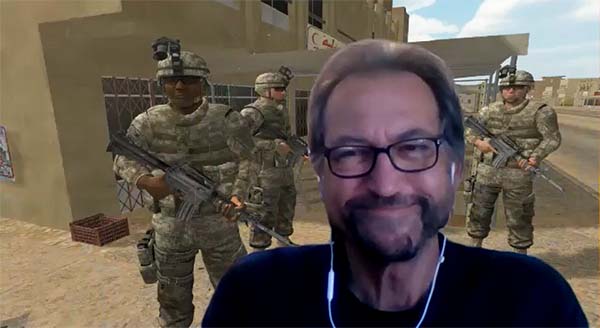Over Coffee® | Stories and Resources from the Intersection of Art and Science | Exploring How to Mak

VR for Well-Being

“It’s all about the patients,” says pioneering psychologist/neuropsychologist Dr. Albert “Skip” Rizzo.
He’s discussing his use of medical virtual reality in clinical psychology.
And for him, it all started in the 1990s, with an observation he made while watching one of his patients absorbed in a popular game.
Fast-forward to today.
With numerous awards for his groundbreaking work, Dr. Rizzo, or Skip, as he prefers to be called, is the Director of Medical Virtual Reality at the University of Southern California’s Institute for Creative Technologies. He also serves as Research Professor and Scientist for both USC’s Department of Psychiatry and Behavioral Sciences and their School of Gerontology.
A range of applications
Among the applications he has created is BraveMind: a VR-based exposure therapy program for PTSD. Traumatic brain injury, autism, and ADHD are among the other clinical conditions for which Skip researches. designs and evaluates VR-based therapy systems.
We first heard one of his presentations during Cedars-Sinai’s inaugural Virtual Medicine conference in 2018. Among the VR applications he shared were one which measured classroom involvement among students with ADD, and game-based systems to assist in post-stroke rehabilitation.
But Skip says there’s much more he wants to do with virtual reality, to serve clinical patients, first responders and members of the medical community.
Skip shared the story of his work with medical virtual reality, explored some of the ways in which this therapy can be helpful to patients on the autism spectrum and offered a look at the areas in which he’d like to expand his work in the future.
On this edition of Over Coffee® we cover:
- Skip’s introduction to virtual reality;
- His process, from there, in implementing VR simulations for brain-injury rehabilitation;
- What he remembers from the early days of treating his patients with VR simulation-based therapy;
- How he and his team currently use VR simulations with virtual humans to help patients on the high end of the autism spectrum;
- A closer look at some of the virtual-reality applications that can enhance empathy across various areas of mental health;
- How some programs developed for patients with autism may also be effective in reducing social anxiety among children and the general public, post-COVID;
- Safety considerations for children in the use of VR in a clinical setting;
- Some of the results Skip has seen;
- His vision for the future of therapeutic virtual reality.






 Visit Podcast Website
Visit Podcast Website RSS Podcast Feed
RSS Podcast Feed Subscribe
Subscribe
 Add to MyCast
Add to MyCast